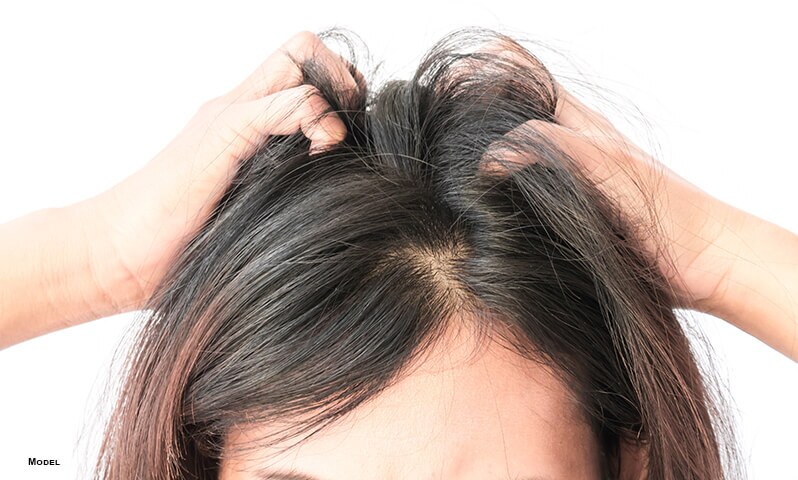Dermatologist Answers: Why Does My Scalp Itch?

An itchy scalp is one of the most common—and most frustrating—skin concerns people face. For some, the itching is a minor nuisance that comes and goes. For others, it can become a persistent problem that interferes with sleep, confidence, or daily comfort. While dandruff is one of the most well-known causes of scalp itch, there are many possible root causes including chronic skin conditions, allergic reactions, and even everyday habits.
In this post, we will take a closer look at the most common medical and non-medical causes of scalp itching. You’ll also learn how to recognize the symptoms of each condition, discover ways to minimize discomfort, and know when it is time to see a dermatologist for expert care.
Dandruff (Seborrheic Dermatitis)
Dandruff, a mild form of seborrheic dermatitis, is one of the most frequent causes of an itchy scalp. This condition is often triggered by an overgrowth of Malassezia, a yeast that naturally lives on the skin, especially when combined with excess oil production or sensitivity. The scalp may appear greasy, red, or irritated and is often covered with white or yellow flakes. Patients typically experience persistent itching that worsens in cold weather or during periods of stress.
Most dandruff can be addressed by using over the counter medicated shampoos containing zinc pyrithione, selenium sulfide, or ketoconazole. For stubborn or severe dandruff that does not improve with over-the-counter shampoos, a dermatologist may recommend in-office treatments. These can include prescription-strength shampoos, topical anti-inflammatory creams, or antifungal solutions to calm the scalp and reduce flaking. In some cases, exfoliating scalp treatments or light therapy may be used to remove buildup and ease irritation. Your dermatologist can also check for other conditions—like psoriasis or product allergies—that may be contributing to the problem.
Dry Scalp
Not all flaking is caused by dandruff. In many cases, especially during colder months or after frequent shampooing, a lack of moisture can dry out the scalp. Dry scalps often feel tight and itchy, with light flaking that resembles fine powder. Flakes from dry scalp are typically smaller and lighter than those seen with dandruff.
Using a gentle, hydrating shampoo and limiting wash frequency can help soothe and restore the scalp’s moisture barrier. Applying light scalp oils or leave-in moisturizers may also be beneficial.
In-office treatments may include prescription topical creams or oils to restore moisture and reduce inflammation. Scalp hydrating treatments or gentle exfoliation may also be used to remove buildup and allow moisturizers to absorb more effectively. Your dermatologist can also check for underlying skin conditions, like eczema or contact dermatitis, that may be causing or worsening the dryness.
Contact Dermatitis or Allergic Reactions
Hair care products can sometimes do more harm than good. If your scalp starts to itch, burn, or become red shortly after using a new shampoo, dye, or styling product, contact dermatitis may be to blame. This reaction can occur when the skin becomes irritated or allergic to ingredients such as fragrances, preservatives, or dyes.
Symptoms often include stinging, redness, or swelling in addition to itching. If a new product is the likely culprit, stop using it immediately.
Mild reactions may improve on their own, while more severe cases may require topical steroids or antihistamines. For more severe symptoms, topical steroids or antihistamines may be needed to calm inflammation.
Scalp Psoriasis
Scalp psoriasis is a chronic autoimmune condition that causes rapid skin cell buildup, resulting in thick, scaly plaques. These plaques are often covered with silvery scales and can be extremely itchy. They may appear on the scalp alone or extend beyond the hairline onto the forehead, neck, or behind the ears. Psoriasis is often genetic and can be triggered by stress, illness, or injury to the skin.
For scalp psoriasis, dermatologists often recommend a combination of prescription treatments to reduce inflammation, slow skin cell buildup, and relieve itching. These may include medicated shampoos, topical steroids, vitamin D analogs, or salicylic acid to help soften and remove plaques. In more severe cases, light therapy or systemic medications like biologics may be needed. A dermatologist can tailor treatment based on the severity of your symptoms and how much of the scalp is affected.
Fungal Infections (Tinea Capitis / Ringworm)
Tinea capitis, or ringworm of the scalp, is a contagious fungal infection that most commonly affects children but can occur in adults as well. The infection causes round, scaly patches of hair loss, often with redness, itching, or tenderness. In some cases, small black dots appear where hair shafts have broken off. Swollen lymph nodes or low-grade fever may also accompany the infection.
Treatment usually requires prescription oral antifungal medication, as topical treatments alone are not effective. A dermatologist may also recommend antifungal shampoos to reduce the spread of the infection and support healing. In some cases, especially in children, treatment may take several weeks and follow-up is important to ensure the infection is fully cleared. Prompt treatment can help prevent complications like hair loss or spreading to others.
Head Lice
A common concern in school-aged children and their families, head lice are tiny parasitic insects that feed on the scalp. The itching, often concentrated behind the ears and along the nape of the neck, is caused by an allergic reaction to their bites. Patients may notice visible lice or nits (eggs) attached to hair near the scalp.
Head lice are treated with special over-the-counter or prescription shampoos designed to kill both the lice and their eggs (nits). A fine-toothed nit comb is often used afterward to help remove remaining lice and eggs from the hair. In more stubborn cases, a dermatologist may recommend a stronger prescription treatment. It is also important to wash bedding, hats, and personal items to prevent re-infestation or spreading lice to others.
Atopic Dermatitis (Eczema)
Eczema is a chronic inflammatory condition that can affect any part of the body, including the scalp. Triggers include allergens, harsh weather, or stress. Scalp eczema typically presents as dry, red, and itchy patches that may flake and resemble dandruff. It often occurs in people with a history of asthma, allergies, or other types of dermatitis.
Fragrance-free shampoos and gentle moisturizers can help calm irritation. Prescription topical steroids may also be needed for flare-ups.
Folliculitis
Folliculitis occurs when hair follicles become inflamed or infected—often due to bacteria, yeast, or irritation from tight hairstyles or occlusive products. This condition appears as small red bumps or pus-filled pimples on the scalp and may be itchy, tender, or painful. In more severe cases, scabbing or hair shedding can occur.
Mild cases may clear with antibacterial cleansers or antifungal shampoos. More severe infections may require topical or oral antibiotics or antifungals.
Scalp Sunburn
Patients who experience scalp itching after spending sunny day outside without a hat or SPF spray may be experiencing scalp sunburn. The skin on the scalp, especially in thinning or part-line areas, is highly vulnerable to UV damage. A sunburned scalp may feel itchy, tight, or painful, and can start to flake or peel as it heals. Cool compresses, soothing aloe vera gel, and gentle cleansing can help relieve discomfort. To prevent future sunburns, use SPF sprays designed for the scalp or wear a hat when outdoors.
Other Factors That Can Trigger Scalp Itching
Hormonal Changes
Fluctuations in hormones can cause noticeable changes in skin and scalp health. During times like pregnancy, menopause, or thyroid imbalance, the scalp may become more oily or unusually dry, both of which can lead to itchiness. If you notice new or persistent scalp symptoms during these transitions, a visit with your dermatologist or primary care provider can help identify whether an underlying hormone issue is contributing.
Stress
Stress can trigger or exacerbate many skin conditions, including those that cause scalp itch. It’s also capable of causing itching without any visible skin changes, through its effects on the nervous system and immune response. People under prolonged stress may find themselves scratching their scalps more frequently, even in the absence of flakes or redness. Incorporating stress-relieving techniques like deep breathing, yoga, or consistent sleep routines can reduce both physical and emotional tension.
Hair Care Habits and Product Buildup
Your washing routine and product choices may also contribute to an itchy scalp. Overwashing strips away the scalp’s natural oils, leading to dryness and irritation. Conversely, underwashing—or using heavy styling products without regular cleansing—can lead to buildup that clogs follicles and causes inflammation.
To support a healthy scalp:
- Aim to shampoo 2–3 times a week, unless directed otherwise.
- Rinse thoroughly to remove all product.
- Use a scalp brush or exfoliator occasionally to keep follicles clean and flake-free.
When to See a Dermatologist
While many cases of scalp itch are harmless and respond well to over-the-counter solutions, others require medical evaluation. It’s time to see a dermatologist if:
- Itching lasts more than a week
- You have severe flaking, burning, or open sores
- You notice signs of infection like swelling, pus, or fever
- There’s hair loss or bleeding from scratching
- Over-the-counter treatments do not help
In rare cases, persistent scalp itching may be linked to internal health issues such as anemia, thyroid disease, or even certain cancers. A dermatologist can help identify when additional testing is necessary.
Disclaimer: The contents of the Westlake Dermatology website, including text, graphics, and images, are for informational purposes only and are not intended to substitute for direct medical advice from your physician or other qualified professional.
